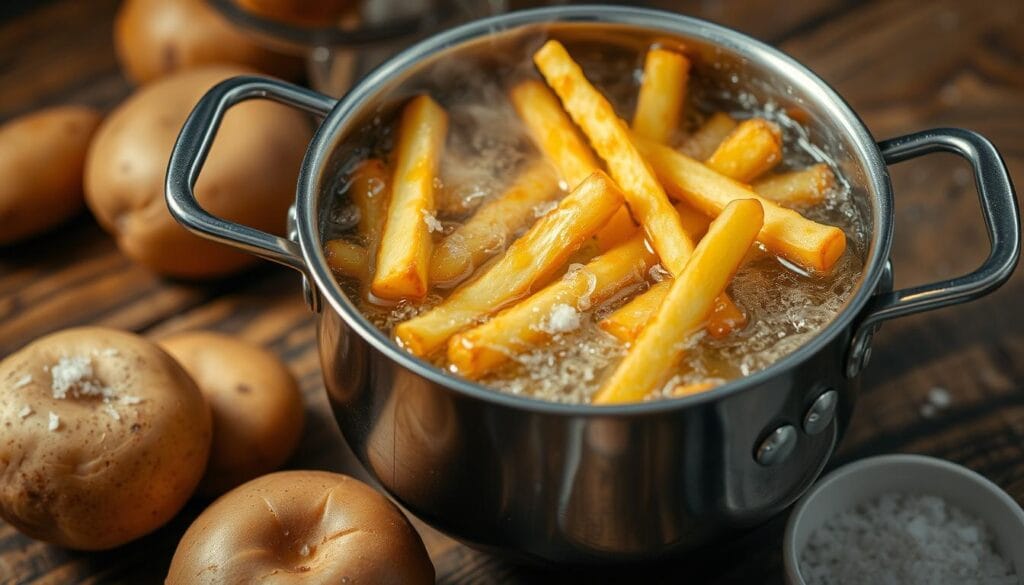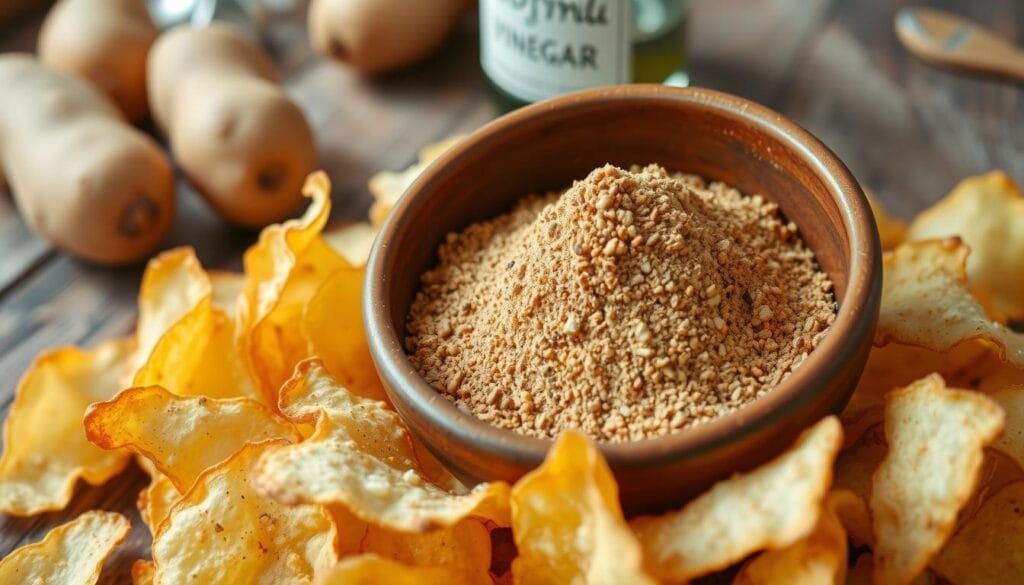Ever wanted that perfect crunch of vinegar fries? The kind that store-bought bags can’t match? I felt the same way until I made my own french fries seasoning at home. The smell of crispy potato snacks filled my kitchen, turning a simple ingredient into a fun adventure.
Making homemade salt and vinegar chips is more than a recipe. It’s a way to connect with your food. With a few simple ingredients and some patience, you’ll make chips that are crisper, tastier, and more satisfying than store-bought ones.
Table of Contents
Essential Ingredients and Equipment for Perfect Chips
Making delicious homemade salt and vinegar chips needs careful prep and the right tools. Start by picking the best ingredients. Then, use the right equipment to turn simple potatoes into crispy, tangy french fry toppings.
Required Kitchen Tools
To make the best salt and vinegar chips, you’ll need a few key tools:
- Sharp mandoline or chef’s knife for precise potato slicing
- Large deep fryer or heavy-bottomed pot
- Candy thermometer for precise oil temperature
- Slotted spoon or wire mesh strainer
- Paper towel-lined baking sheet for draining
Key Ingredients Overview
The base of great homemade chips is the right ingredients:
| Ingredient | Quantity | Purpose |
|---|---|---|
| Russet Potatoes | 2 pounds (4 large) | Primary chip base |
| Distilled White Vinegar | 3 tablespoons | Flavor enhancement |
| Vegetable Oil | 3 quarts | Frying medium |
| Kosher Salt | To taste | Final seasoning |
Understanding Vinegar Types
Not all vinegars are the same for your vinegar marinade. White distilled vinegar gives a sharp, clean tang. Apple cider vinegar is slightly sweeter. Malt vinegar brings a traditional British flavor that many love.
“The secret to great salt and vinegar chips lies in understanding how different vinegars interact with potato starches.”
Your success in making chips depends on using high-starch potatoes like Russets. They have about 18% starch and 80% moisture. This makes them extra crispy when turned into your favorite french fry toppings.
Why Homemade Salt and Vinegar Chips Are Better Than Store-Bought
Making your own salt and vinegar chips turns a simple snack into a special treat. Store-bought chips are easy to find, but they can’t compare to homemade ones. Homemade chips let you control the flavor and quality, something mass-produced chips can’t offer.
When you make salt and vinegar chips at home, you get to play with different vinegar flavors. This lets you create unique and delicious tastes. The benefits include:
- Complete ingredient control
- Elimination of unnecessary preservatives
- Fresh, authentic taste
- Cost-effective snack preparation
“Homemade chips are not just a snack, they’re a culinary adventure.” – Culinary Enthusiast
The history of flavored chips started in the 1950s with Tayto, an Irish company. By making chips at home, you join this tradition of exploring new flavors.
| Aspect | Homemade Chips | Store-Bought Chips |
|---|---|---|
| Ingredient Quality | Full Control | Limited Options |
| Flavor Customization | Unlimited | Preset Varieties |
| Preservatives | None | Often Present |
Choosing homemade salt and vinegar chips opens up a world of creativity in cooking. It also means healthier, more tailored snacking.
Preparing Your Potatoes for Optimal Results
Creating delicious crispy fries and potato snacks starts with expert potato preparation. Your success in the kitchen depends on selecting the right potatoes and mastering precise cutting techniques.
Before you begin making your homemade salt and vinegar chips snacks, understanding the fundamentals of potato selection and preparation is crucial. Not all potatoes are created equal when it comes to creating the perfect crispy fries.
Selecting the Perfect Potato Varieties
When crafting salt and vinegar chips, choose potatoes that guarantee exceptional results. Russet potatoes remain the top choice for creating crispy fries due to their high starch content and low moisture.
- Russet potatoes: Ideal for crispy exterior
- Yukon Gold: Alternative with creamy texture
- Red potatoes: Less recommended for frying
Precise Slicing Techniques
Achieving uniform thickness is essential for creating consistent crispy fries. A mandoline provides the most accurate slicing method, ensuring each potato slice is approximately 1/10 inch (2.5 mm) thick.
Mandoline Safety Recommendations
Mandolines are sharp tools that require careful handling. Always use the provided hand guard to protect your fingers from potential cuts.
Pro Tip: Cold water and a splash of vinegar can prevent potato discoloration during preparation.
| Potato Type | Ideal Thickness | Frying Performance |
|---|---|---|
| Russet | 1/10 inch (2.5 mm) | Excellent crispiness |
| Yukon Gold | 1/8 inch (3 mm) | Good crispiness |
| Red Potatoes | Not recommended | Poor frying results |
Remember, practice makes perfect when preparing potato snacks. Take your time, follow safety guidelines, and enjoy the process of creating restaurant-quality crispy fries at home.
The Secret Behind Vinegar Fries and Chip Flavoring
Making salt and vinegar chips that taste like store-bought chips is more than just vinegar. Vinegar powder is the secret ingredient that makes your homemade snacks tangy and delicious.
Vinegar marinades have come a long way, and chefs know seasoning fries is an art. The secret to that amazing flavor is knowing how to add vinegar essence to your chips.
“The secret is not just in the vinegar, but in how you apply it.” – Culinary Experts
Vinegar Powder: The Flavor Breakthrough
- Concentrated vinegar flavor without excess moisture
- Ensures even distribution of tangy taste
- Prevents soggy chips
When picking vinegar powder for homemade chips, here are some top choices:
| Vinegar Type | Flavor Profile | Best Used For |
|---|---|---|
| Malt Vinegar Powder | Rich, deep tanginess | Classic potato chips |
| Apple Cider Vinegar Powder | Slightly sweet, mild acid | Lighter chip varieties |
| White Wine Vinegar Powder | Crisp, clean flavor | Delicate chip styles |
To get the best vinegar fries, sprinkle your chosen vinegar powder right after cooking. The heat helps the seasoning stick, making a delicious coating that tastes like pro-made chips.
Pro tip: Try different vinegar powder flavors to find your favorite!
Mastering the Vinegar Soaking Process
Creating the perfect salt and vinegar chips begins with a key step: the vinegar marinade. This process turns regular potato slices into a tangy, flavorful snack. It will make your taste buds dance.
The vinegar dip is more than a simple soak. It’s an art that needs precision and understanding of flavor infusion. Your goal is to make chips with a bold vinegar taste without losing the potato’s texture.
Timing and Temperature Control
Achieving the perfect vinegar marinade depends on timing and temperature. Here’s a breakdown of the optimal soaking process:
- Soak potato slices in white distilled vinegar
- Maintain room temperature during soaking
- Avoid refrigeration to prevent moisture buildup
Vinegar-to-Water Ratios
The right balance of vinegar and water is crucial for flavorful chips. Consider these recommended ratios:
| Flavor Intensity | Vinegar | Water | Soaking Time |
|---|---|---|---|
| Mild | 1/4 cup | 3/4 cup | 15-20 minutes |
| Medium | 1/2 cup | 1/2 cup | 30 minutes |
| Strong | 3/4 cup | 1/4 cup | 45 minutes |
“The secret to great salt and vinegar chips lies in the perfect vinegar marinade.” – Potato Chip Artisan
After soaking, drain and pat dry your potato slices. This ensures crispy chips with a strong vinegar flavor. They will rival any store-bought variety.
Deep Frying Techniques for Crispy Results

To make perfect salt and vinegar chips, you need to master deep frying. It’s all about turning simple potato slices into golden, crunchy treats. The key is to understand the deep frying process well.
Choosing the right oil is the first step. You should use:
- Peanut oil
- Canola oil
- Refined safflower oil
Keeping the oil at the right temperature is vital. Heat it to 350°F (175°C). This ensures your fries cook evenly and don’t soak up too much oil.
“The magic of crispy fries happens in two strategic frying stages.”
Here’s how to deep fry like a pro:
- First fry: Cook at 320°F for about 3 minutes to soften potatoes
- Second fry: Increase temperature to 375°F for 5-8 minutes to get a crispy outside
- Drain excess oil on paper towels
For the best results, fry in small batches. About 10 potato strips at a time. This keeps the oil temperature steady and makes each fry golden and crunchy.
Once fried, keep your fries warm in a preheated oven at 200°F. They’ll stay crispy for up to 20 minutes.
Alternative Cooking Methods: Baking and Air Frying
Want crispy salt and vinegar chips without deep frying? You’re in luck! Oven baking and air frying are great alternatives. They use less oil and have fewer calories.
Modern home cooks have found new ways to make crispy fries. These methods are healthier and easier. They use less oil and give great results.
Oven-Baked Potato Chips Method
Baking your snacks is a low-fat option. Here’s how to make crispy fries in the oven:
- Preheat oven to 400°F (200°C)
- Arrange potato slices on a single layer baking sheet
- Lightly spray or brush with olive oil
- Bake for 10-15 minutes until golden brown
- Flip halfway through for even crispiness
Air Fryer Technique for Perfect Chips
Air fryers have changed home cooking. They make crispy salt and vinegar chips with little oil.
| Air Fryer Setting | Temperature | Cooking Time |
|---|---|---|
| Potato Chip Setting | 375-400°F | 15-20 minutes |
Pro tips for air frying potato snacks:
- Use 1-2 tablespoons of olive oil
- Don’t overcrowd the basket
- Shake basket midway for even cooking
- Choose Russet potatoes for best results
“Air fryers can reduce fat content by up to 90% compared to traditional deep frying!” – Culinary Nutrition Experts
Both methods are great alternatives to deep-frying. They let you enjoy crispy fries with less oil and less guilt.
Perfect Seasoning: Salt and Vinegar Powder Application
Making the ultimate french fries seasoning is an art. It turns simple chips into a culinary masterpiece. The secret is finding the right mix of vinegar and salt for those sour flavors that excite your taste buds.

- Use 1 tablespoon of vinegar powder for every batch of chips
- Sprinkle 1/2 teaspoon of fine salt evenly across the surface
- Season chips immediately after cooking while they’re still warm
“The magic happens when the warm chips absorb the seasoning, creating an explosion of tangy flavor.”
Experts say to season in stages. Start with a light dusting, then taste and adjust. The key is building layers of flavor without overpowering the potato.
Want to try something new? Here are some flavor ideas:
- Smoked paprika salt and vinegar blend
- Herb-infused vinegar powder
- Chili-lime seasoning twist
Your homemade chips will go from ordinary to amazing with these seasoning tips. The aim is to find a balance that makes each bite unforgettable.
Storage Tips and Shelf Life
Keeping your homemade potato snacks crunchy is key. Enjoy them best within a day. But, with the right storage, you can savor them longer.
Here’s how to keep your snacks fresh:
- Cool chips completely before storing
- Use airtight containers to prevent moisture
- Store at room temperature
- Avoid humid environments
Choosing the right container is crucial. Glass or hard plastic containers with tight-fitting lids are ideal. They help keep your snacks fresh and crunchy.
| Storage Method | Expected Freshness |
|---|---|
| Airtight Container (Room Temperature) | 3-5 days |
| Refrigerated | 1-2 days |
“The secret to great potato snacks is not just in making them, but in keeping them crisp!” – Culinary Expert
Look out for staleness signs like softness or odd smells. If chips lose crispiness, try crisping them in a 350°F oven for 3-5 minutes.
Pro tip: Enjoy your homemade potato snacks within 24-48 hours. This way, you get the best crunch and flavor.
Conclusion
Making delicious homemade salt and vinegar potato snacks is an art. It combines technique, creativity, and passion. Your journey with vinegar fries is just starting. You’ll explore new flavors and improve your skills.
When you make potato snacks at home, you control what goes in. You can avoid additives and make it your own. With time, you’ll get better at picking potatoes, soaking them, and seasoning. This turns simple ingredients into amazing crispy treats.
Keep trying different vinegars and potatoes to find your favorite. Homemade chips are more than a snack; they’re a way to show off your creativity. Share your chips with friends and family. They’ll love what you’ve made.
Your adventure with salt and vinegar chips is about being creative and understanding flavors. With each batch, you’ll get better. Soon, you’ll make gourmet potato snacks that are as good as any store-bought ones.

